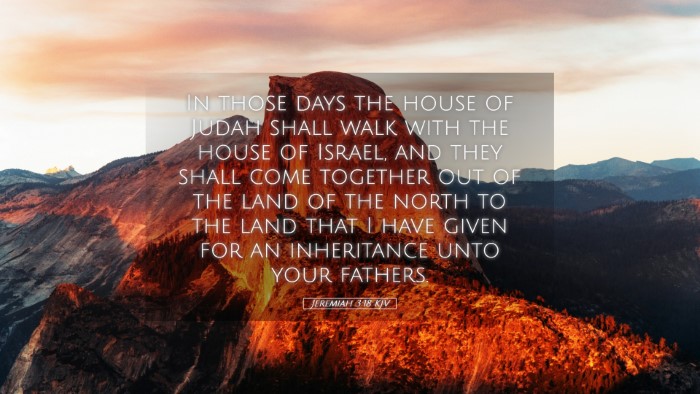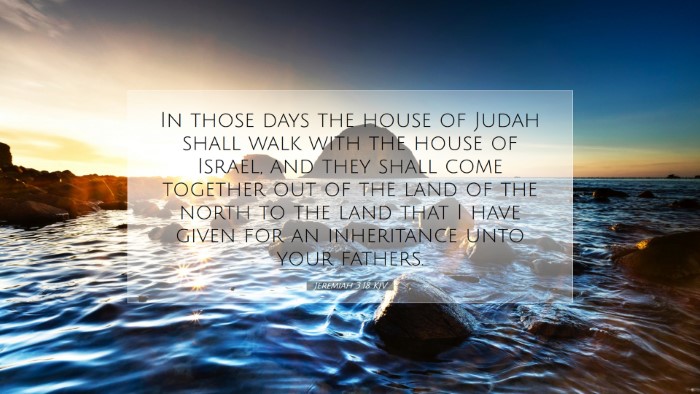Commentary on Jeremiah 3:18
Jeremiah 3:18 states: "In those days the house of Judah shall walk with the house of Israel, and they shall come together out of the land of the north to the land that I have given for an inheritance unto your fathers." This verse reflects a profound promise of restoration and unity among God's people, which can be richly understood through various perspectives offered in public domain commentaries.
Historical Context
In understanding this verse, one must consider the historical setting of Jeremiah's ministry. The prophet delivered his messages during a tumultuous time in Israel's history. The northern kingdom (Israel) had already fallen to Assyria, while the southern kingdom (Judah) was on the brink of Babylonian exile. This context of division and impending judgment sets the stage for God's promise of future reconciliation.
Theological Insights
Commentators like Matthew Henry emphasize the theological ramifications of the reunion of Judah and Israel. Henry notes that this prophetic vision indicates the faithfulness of God to His covenant promises and the eventual restoration of His people. The phrase "those days" refers to a future time post-exile when God would act decisively to gather His scattered flock. It underlines God's sovereignty and His intention to bring His people back, not just to a physical place, but into a right relationship with Himself.
Symbolism of Northern Land
The "land of the north" in this verse is symbolic of exile and estrangement. Albert Barnes provides insight into the implications of this phrase. He suggests that it serves as a reminder of the geographical and spiritual distance that existed between these two kingdoms. Their coming together signifies not merely physical reunion but also a spiritual restoration. The Northern tribes, often viewed as lost or forsaken, represent those who had strayed farthest from God yet are promised a return.
Unity and Restoration
The divine promise of unity is crucial. Adam Clarke points out that unity among the divided houses is a sign of God's redemptive purpose in history. This verse foreshadows the New Covenant, where Jews and Gentiles are called to be one body in Christ. Clarke reflects on how this unification is not only a hope for Israel but for the entirety of God's creation. The prophetic vision encapsulates the broader theme of reconciliation that permeates Scripture.
Application for Today
The message of Jeremiah 3:18 resonates today as it encourages believers to pursue unity in the Body of Christ. Much like the historical realities faced by Judah and Israel, contemporary society is often marked by division and fragmentation. Pastors and church leaders are urged to heed this call to unity, fostering an environment where different backgrounds and experiences can come together under the lordship of Christ.
Enduring Covenant
The mention of "the land that I have given for an inheritance unto your fathers" indicates the everlasting covenant that God has with His people. Matthew Henry highlights that this inheritance is significant for it represents not only physical land but encompasses the spiritual blessings attached to being God’s chosen ones. God's promise is to restore their rightful inheritance, symbolizing the ultimate hope of eternal life and dwelling in His presence for believers.
Conclusion
In summary, Jeremiah 3:18 serves as a beacon of hope for divided peoples. The insights from Matthew Henry, Albert Barnes, and Adam Clarke converge on the themes of unity, restoration, and the faithfulness of God to fulfill His covenant. As we reflect on this passage, let us be reminded of God's unwavering commitment to gather His people and lead them into a deeper communion with Him and one another. The call is clear: to embrace reconciliation and work towards unity in Christ, who is the ultimate fulfillment of the promises contained within this profound verse.


